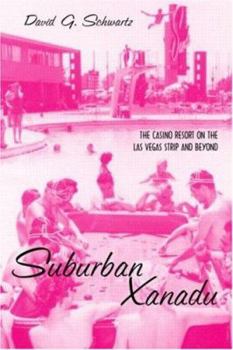Suburban Xanadu: The Casino Resort on the Las Vegas Strip and Beyond
Select Format
Select Condition 
Book Overview
Urban gambling, linked to poverty, crime and corruption, was once considered a blight on US cities. Gambling then followed the exodus of Americans into the suburbs after World War II and now, at the beginning of the 21st century, most Americans live within a four-hour drive of a casino. What explains the success of places like Las Vegas? The self-contained casino resort removes gambling and its social problems from cities and provides Americans with...
Format:Paperback
Language:English
ISBN:0415935571
ISBN13:9780415935579
Release Date:June 2003
Publisher:Routledge
Length:256 Pages
Weight:1.05 lbs.
Dimensions:0.6" x 6.4" x 9.0"
Related Subjects
20th Century Earth Sciences Gambling Geography History Human Geography Humor & Entertainment Political Science Politics & Government Politics & Social Sciences Poverty Public Affairs & Policy Public Policy Puzzles & Games Regional Science & Math Social Policy Social Science Social Sciences Sociology State & Local UrbanCustomer Reviews
5 ratings
Great Read
Published by Thriftbooks.com User , 19 years ago
Suburban Xanadu is a great book that really captures the history of Las Vegas. I took the class that was taught by Professor David Schwartz and it was well worth buying the book. I have had many of my friends and business colleagues read this book and they thought it was great. Suburban Xanadu is must read to truly understand Las Vegas past and how it all got started.
Onward to Sybaropolis, my friends!
Published by Thriftbooks.com User , 20 years ago
Any man that can write a book with a bright pink cover must be very secure in his masculinity. Dr. Schwartz is also very secure in his knowledge of the "real" history of gambling, legalized or otherwise. Just when you think you know the truth, as it has been told for generations, here comes a maverick historian to turn your conceptions upside-down. Seriously, does anyone have any respect for Senator McCarran before they read about his valiant battle to keep Nevada's peculiar peculiarity as peacefully peculiar as possible, without the wretched government interfering? And would the world's FOREMOST AUTHORITY on gambling, Dr. William Eadington, make Dr. David Schwartz's book required reading for his class if it were not one of the leading texts on the subject? His book is a true delight to read, and, as it is broken up into bite-sized sections with headings such as "The Californication of the casino resort" and "Requiem for a bootlegger", you can read a few pages and then ponder or nap without the guilt associated with reading only halfway through a chapter. How's that for a review that sounds like it was poured straight from the fount of the commonfolk! Normal people DO read this kind of stuff too, so don't be afraid to crack it open!
Excellent History
Published by Thriftbooks.com User , 20 years ago
David Schwartz has written a persuasive explanation of the success of post-World War II casino resorts in Las Vegas. In the process, he deftly deals with a number of important elements in that success: the long-time American fascination with gambling, the backgrounds of early casino developers, the evolving themes evident in casinos beginning with Old West motifs, the role of organized crime figures and corporate investment, the rise of megaresorts, casino design, the importance of publicists, and the expansion of legalized gambling across the nation. Most importantly, Schwartz makes a strong case that as post-World War II Americans supported efforts to curb gambling in their locales, they eagerly traveled to Las Vegas in ever larger numbers to gamble in an unthreatening environment provided by the rapidly proliferating casino resorts along the famous "Strip." They were largely middle class suburbanites who "fundamentally wanted to gamble in suburban resorts." Casino developers provided what these affluent Americans wanted: star entertainers, fabulous resort facilities, fine dining, and a chance win money. In short, they offered fantasy and fun in a safe place. Schwartz's account is convincing. Casino developers in Las Vegas have provided Americans with a leisure time experience that is now widely perceived as "socially innocuous and economically beneficial."
Historical Excellence
Published by Thriftbooks.com User , 20 years ago
Most writings on casino life in the U.S. are larded with celebrity vignettes, unsubstantiated data, and airy fluff. But David Schwartz has produced a well-researched, carefully documented, clearly written historical account of Las Vegas casino culture from its inception in the early 1930s to the present. His carefully contextualized work shows how changing currents in American cultural life and leisure preferences shaped the style, architecture, and budgetary considerations of those who aimed to profit from casino ownership in an improbable desert environment. One learns from his book of the risk involved in such investments, and how the famous Las Vegas strip has always rested on unsteady financial and political pylons. Finally we have a solid, fascinating historical account of the casino industry and its consumers.
The author hits the jackpot!
Published by Thriftbooks.com User , 21 years ago
The author, a professor and coordinator of the Gaming Studies Research Center at the University of Nevada at Las Vegas, really hits the jackpot with this, his first publication. Although I am a financial analyst, specializing in the gaming industry, I was intrigued by Dr. Schwartz's historical analysis of the development of legalized gaming in Las Vegas and throughout the United States. The book is extremely well-researched and, while clearly written by a scholar, it has a friendly, accessible style. Suburban Xanadu has something for those interested in business, American history, popular culture, gaming, "the Rat Pack," sociology, etc. I have recommended this book to my colleagues and I look forward to reading future works from this unique young author.





